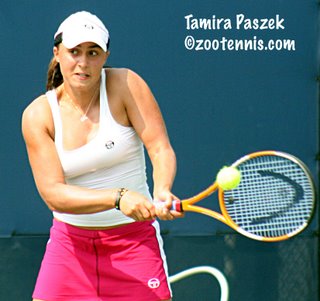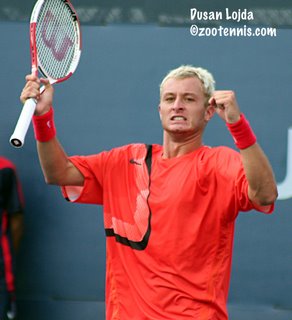Polansky Defeats Young, Meets Lojda in Final; Pavlyuchenkova Goes for Second Junior Slam Title Against Paszek

©Colette Lewis 2006
Flushing Meadows--
It's time for me to confess that I didn't see a single point of Lauren Albanese's 6-2, 6-2 semifinal loss to Tamira Paszek of Austria, because it was played at precisely the same time as the Donald Young and Peter Polansky match on courts separated by crowds and distance on a beautiful Super Saturday at the Billie Jean King National Tennis Center. I did see every point of the boys semifinal contest, however, a 6-3, 6-7 (2), 6-3 victory for the unseeded Canadian.
In the first set, Polansky started off quickly, as he had done all week, breaking Young in the fourth game, although actually Young broke himself with a double fault. The 17-year-old from Atlanta dropped his next service game too, and Polansky needed the cushion, when he was broken serving for the set at 5-1.
When Polansky pounced on Young in the first game of the second set, it looked as if the 18-year-old Canadian was headed for a straight set victory, but Young dug in, broke back for 1-1 and the battle lines were drawn for a tiebreak.
"It was a close second set," Polansky said, "and he played really well in the breaker. He barely missed a first serve."
With the match even, Polansky, whose only show of emotion is an occasional subdued "c'mon" after a winner, didn't waiver, continuing to hit with pace and depth while concentrating on holding serve.
"I knew he was a really good returner," Polansky said, "so I tried to put as many first serves in as possible to put him off the court."
Dean Coburn, Polansky's coach, identified the match's turning point.
"I think he played very aggressive, while still keeping the errors down. He stepped up his serve in the third set, got the early break and made Young lose some focus."
It was the fourth game that Young lost, and when Polansky held for 4-1, he began to see the finish line.
"He started to sit back and hit more loopy shots, more spinny shots, just rally a bit, so every short ball I had, I tried to put him trouble, force a few more errors."
It wasn't just errors from Young that produced points for Polansky. He hit both forehand and backhand winners against the lefthander, which, as Young previous opponents would testify, is difficult to do. With speed, court positioning and an instinct for the next shot, Young can win points that should be over, but Polansky's depth and placement were too much for him, and chasing shot after shot eventually wore him down.
"I was running around a lot and hitting a lot of forehands, putting him on the run," Polansky said. "I was just going after it and a lot of them were going in."
Polansky now faces Czech Dusan Lojda, who has played only one other Junior Grand Slam this year--the Australian, where he lost in the round of 16. The 18-year-old lefthander has instead been competing in Futures events, earning enough points for an ATP ranking of 598, for which he received a seeding of 10 for the US Open Juniors.
Lojda defeated his good friend Luka Belic, the ninth seed, 6-3, 6-4 in a match that had widely varying levels of play.
"I play against him for the first time, and it was a very nervous start," said Lojda. "But then I break his serve and it was a little bit easier. But it wasn't like 6-3, 6-4, it was much tougher."
Lojda and Polansky have never played, but Lojda watched the Canadian take out the Czech Republic's no. 2 player Roman Jebavy on Friday and he was impressed.
"He's playing good and I am playing also good, it's the U.S. Open final, so we will see."
Tamira Paszek is playing in her third U.S. Open Junior Championship at the age of 15, and is no stranger to Junior Grand Slam finals, as she was runnerup at Wimbledon in 2005. But in Albanese, she had an opponent who had recently beaten her, at the Luxilon Cup, a junior exhibition held in conjunction with the NASDAQ (now Sony Ericsson) Pro event in Key Biscayne.
"I was a little nervous in the beginning because I played her in April and I lost to her in two sets, so I knew she was a great player, but then I got my rhythm and I played really, really well," said Paszek, who trained at home in Austria prior to coming to New York. "We had some great ball exchanges, some great rallies."
So did top seed Anastasia Pavlyuchenkova and unseeded Katerina Vankova of the Czech Republic--at least in the first set--until Pavlyuchenkova pulled away for a 7-6 (4), 6-0 victory, and her third final in a Junior Grand Slam this year.
"I think it was a pretty tough match. I know her a little bit, I played against her once, and she's lefty, so it's good for her and uncomfortable for me," said the 15-year-old from Samara, Russia, who won the Australian Open Junior Championship in January.
"She concentrated on the first set really well. She got every ball into the court, and it was pretty difficult for me. I was down in the first set, and when I came back, I think I just broke her mentally."
The Paszek Pavlyuchenkova final will be a rematch of their quarterfinal meeting in Roland Garros this year, won by the 15-year-old Russian 6-4 in the third set. And with one title already and the no. 1 ITF ranking, it's no suprise that she's confident.
"Actually I expected the final," she said, pausing to amend that. "I expected good results. I just wanted to show my good game."









4 comments:
All american doubles final boys doubles. Exactly what America needed!!!
Collette,
Have you had a chance to read the Albanese-Paszek match report on the US Open site?
If the intention was to be smug and condescending then it really hit the mark. If the aim was to showcase the writer's lack of skill then, mission accomplished. If the goal was to be insulting - to the players and the reader's intelligence- then it succeeded. However, if the objective was to provide a reasoned account of a tennis match then it failed on a truly grand scale.
For the first time in years I cannot go to the Boys final because of this crazy 12 o'clcok stop which leaves me wandering around for hours until the final. So I will depend on you. I sat throught the whole Polansky-Young match. The young Canadian played very well. He got a little impatient there in the second set with some of Young's high bouncing returns but all in all a very good win. Donald-as ever-is a puzzle to me. He may sprout six inches but I doubt it. His body language too often signals frustration. Too many expectations have been placed on his young shoulders. There are times when I think how well Federer was served by not achieving his success until he was older, wiser and physically mature.
Collette,
Thanks for the great reporting from the Open.
I am pleased to have found an intelligent source for junior news.
Post a Comment